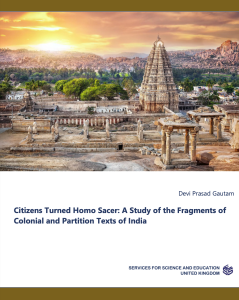Citizens Turned Homo Sacer: A Study of the Fragments of Colonial and Partition Texts of India
Devi Prasad Gautam
- Keywords:
- Partition, Bare Life, State of Exception, Homo Sacer, Coercion, Dominance
- Abstract:
- This paper examines novels such as Kipling’s Kim, Collins’s The Moonstone, Forster’s A Passage to India, Azad’s India Wins Freedom, and Manto’s Partition vignettes and short stories such as “Humility,” “Correction,” “The Price of Freedom,” “The Dog of Titwal,” and “Toba Tek Singh,” by using insights from the biopolitical ideas of Michel Foucault and Georgio Agamben, and the subalternist historiography of Ranajit Guha. Showing some differences between Agamben’s concept of the state of exception and the colonial government of India, this study explains that although British ruled over the subcontinent without exclusively following the policy of pure dominance as Guha asserts, it nevertheless treated the natives with prejudice. The texts reveal that despite the ostensible liberal attitude of the British colonialists and the Indian nationalists toward the natives whom they promised a privileged life during their reign, the citizens suffered as bare life without any social, political, or legal significance. This paper argues that the Indian subalterns could not attract the attention of official histories, lived in anxiety, fear, and uncertainty, and died as homo sacers, or non-entities, or as undesirable, dispensable Musselman— whose existence at the threshold between life and death remained insignificant and whom the state killed with impunity. The tyrannical governments, that resembled state of exception, failed in case of the native mass who not only led meaningless life but also endured insufferable physical pain primarily because of the state’s bias that focused on the consolidation of the empire and the welfare of its metropolis citizens.

Published
- January 12, 2024
Categories
Copyright
- Copyright (c) 2024 Devi Prasad Gautam
License
This work is licensed under a Creative Commons Attribution 4.0 International License.